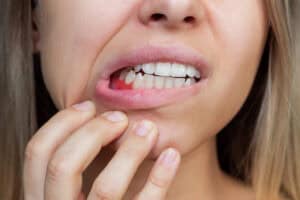
Bleeding gums are a common issue, and our Northfield Dental Group patients often ask our dedicated specialists, whether it’s something they need to be worried about.
In this blog we help you understand what might be causing your gums to bleed and what you can do about it.
Causes of Bleeding Gums
Some of the main causes of bleeding gums are:
- Poor oral hygiene: Poor oral hygiene causes plaque buildup, which can lead to gum irritation and bleeding.
- Gingivitis: This is the early stage of gum disease. It causes red, swollen, and bleeding gums.
- Periodontitis: If untreated, gingivitis can lead to periodontitis, a more severe gum disease. Periodontitis can cause gum erosion, tooth loss, and bone loss.
- Brushing Too Hard: Using a hard-bristle toothbrush or brushing too much force can damage your gums.
- Vitamin Deficiencies: Lack of certain vitamins, especially vitamins C and K, can cause gums bleeding.
- Medication: Certain prescription drugs, for example, blood thinners, can increase the risk of bleeding gums.
In many cases a few of these factors combine to cause bleeding gums.
How to Prevent Bleeding Gums
You can help prevent bleeding gums with:
Good oral hygiene
Brushing twice daily (morning and night) and flossing once daily can prevent plaque buildup. Use a toothbrush with soft bristles to avoid damaging your gums. Remember, you’re not scrubbing tiles: Your teeth and gums need gentler treatment than a hard toothbrush can provide.
Regular dental checkups
Regular cleanings and checkups allow us to catch and treat any issues early on.
Healthy diet
The best diet is well-balanced, with minimal sugars and processed foods. Certain foods, such as crunchy veggies, promote saliva flow and help keep gums and teeth clean and healthy. Adding foods rich in Omega-3 fatty acids, like fatty fish and nuts, can help fight inflammation and keep your gums healthy.
Quit Smoking
If you smoke, you have double the risk of gum disease compared to nonsmokers. We recommend quitting —the sooner, the better.
When to See a Dentist About Bleeding Gums
If you notice your gums bleeding regularly, reach out for help right away. Some signs that you should call us are:
- Gums bleed every time you brush or floss
- Swollen, red, or painful gums
- A change in the way your teeth fit together
- Persistent bad breath or a bad taste in your mouth
Ignoring these symptoms could eventually lead to gum recession and tooth loss, but if you act early, you can prevent those problems.
Get Help with Bleeding Gums Now
Your gum health and general wellness go hand-in-hand, and we’re here to help you improve both. Call our office at (973) 736-0111 or contact us online to get help today.




 Our Practice
Our Practice Our Doctors
Our Doctors Blog
Blog Special Offers
Special Offers Financing
Financing Testimonials
Testimonials